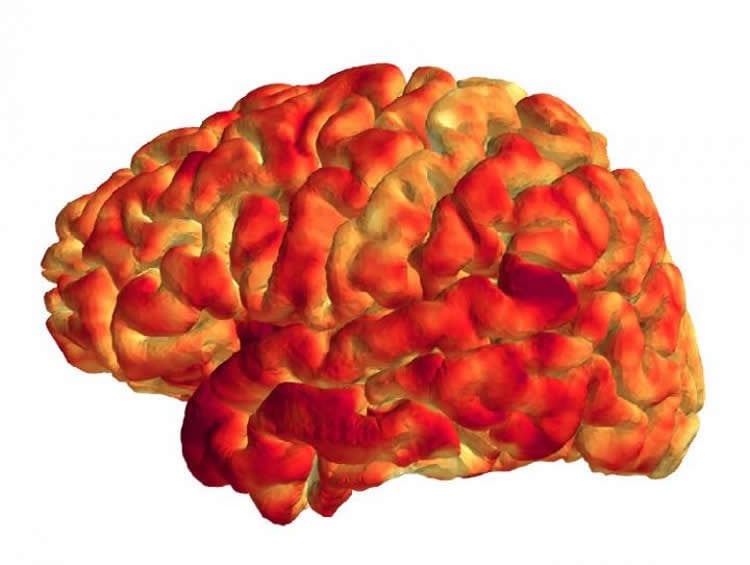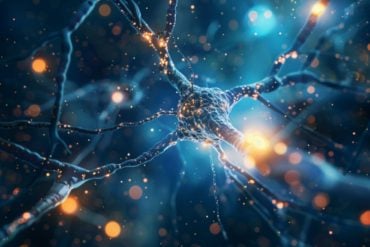Summary: Researchers discover both the structure of specific brain areas and memory are linked to genetic activity that also play important roles in immune system function.
Source: University of Basel.
The body’s immune system performs essential functions, such as defending against bacteria and cancer cells. However, the human brain is separated from immune cells in the bloodstream by the so-called blood-brain barrier. This barrier protects the brain from pathogens and toxins circulating in the blood, while also dividing the immune cells of the human body into those that fulfill their function in the blood and those that work specifically in the brain. Until recently, it was thought that brain function was largely unaffected by the peripheral immune system.
However, in the past few years, evidence has accumulated to indicate that the blood’s immune system could in fact have an impact on the brain. Scientists from the University of Basel’s Transfaculty Research Platform Molecular and Cognitive Neurosciences (MCN) have now carried out two independent studies that demonstrate that this link between the immune system and brain is more significant than previously believed.
Search for regulatory patterns
In the first study, the researchers searched for epigenetic profiles, i.e. regulatory patterns, in the blood of 533 young, healthy people. In their genome-wide search, they identified an epigenetic profile that is strongly correlated with the thickness of the cerebral cortex, in particular in a region of the brain that is important for memory functions. This finding was confirmed in an independent examination of a further 596 people. It also showed that it is specifically those genes that are responsible for the regulation of important immune functions in the blood that explain the link between the epigenetic profile and the properties of the brain.
Gene variant intensifies traumatic memories
In the second study, the researchers investigated the genomes of healthy participants who remembered negative images particularly well or particularly poorly. A variant of the TROVE2 gene, whose role in immunological diseases is currently being investigated, was linked to participants’ ability to remember a particularly high number of negative images, while their general memory remained unaffected.

This gene variant also led to increased activity in specific regions of the brain that are important for the memory of emotional experiences. The researchers also discovered that the gene is linked to the strength of traumatic memories in people who have experienced traumatic events.
The results of the two studies show that both brain structure and memory are linked to the activity of genes that also perform important immune regulatory functions in the blood. “Although the precise mechanisms behind the links we discovered still need to be clarified, we hope that this will ultimately lead to new treatment possibilities,” says Professor Andreas Papassotiropoulos, Co-Director of the University of Basel’s MCN research platform. The immune system can be precisely affected by certain medications, and such medications could also have a positive effect on impaired brain functions.
Innovative research methods
These groundbreaking findings were made possible thanks to cutting edge neuroscientific and genetic methods at the University of Basel’s MCN research platform. Under the leadership of Professor Andreas Papassotiropoulos and Professor Dominique de Quervain, the research platform aims to help us better understand human brain functions and to develop new treatments for psychiatric disorders.
Source: Olivia Poisson – University of Basel
Image Source: NeuroscienceNews.com image is credited to University of Basel, Transfaculty Research Platform Molecular and Cognitive Neurosciences.
Original Research: Full open access research for “A peripheral epigenetic signature of immune system genes is linked to neocortical thickness and memory” by Virginie Freytag, Tania Carrillo-Roa, Annette Milnik, Philipp G. Sämann, Vanja Vukojevic, David Coynel, Philippe Demougin, Tobias Egli, Leo Gschwind, Frank Jessen, Eva Loos, Wolfgang Maier, Steffi G. Riedel-Heller, Martin Scherer, Christian Vogler, Michael Wagner, Elisabeth B. Binder, Dominique J. -F. de Quervain & Andreas Papassotiropoulos in Nature Communications. Published online April 26 2017 doi:10.1038/ncomms15193
Abstract for “Exome sequencing of healthy phenotypic extremes links TROVE2 to emotional memory and PTSD” by Angela Heck, Annette Milnik, Vanja Vukojevic, Jana Petrovska, Tobias Egli, Jochen Singer, Pablo Escobar, Thierry Sengstag, David Coynel, Virginie Freytag, Matthias Fastenrath, Philippe Demougin, Eva Loos, Francina Hartmann, Nathalie Schicktanz, Bernardo Delarue Bizzini, Christian Vogler, Iris-Tatjana Kolassa, Sarah Wilker, Thomas Elbert, Torsten Schwede, Christian Beisel, Niko Beerenwinkel, Dominique J.-F. de Quervain & Andreas Papassotiropouloss in Human Behavior. Published online March 27 2017 doi:10.1038/s41562-017-0081
[cbtabs][cbtab title=”MLA”]University of Basel “Link Between Immune System, Memory and Brain Structure Discovered.” NeuroscienceNews. NeuroscienceNews, 26 April 2017.
<https://neurosciencenews.com/immune-system-memory-neuroanatomy-6509/>.[/cbtab][cbtab title=”APA”]University of Basel (2017, April 26). Link Between Immune System, Memory and Brain Structure Discovered. NeuroscienceNew. Retrieved April 26, 2017 from https://neurosciencenews.com/immune-system-memory-neuroanatomy-6509/[/cbtab][cbtab title=”Chicago”]University of Basel “Link Between Immune System, Memory and Brain Structure Discovered.” https://neurosciencenews.com/immune-system-memory-neuroanatomy-6509/ (accessed April 26, 2017).[/cbtab][/cbtabs]
Abstract
A peripheral epigenetic signature of immune system genes is linked to neocortical thickness and memory
Increasing age is tightly linked to decreased thickness of the human neocortex. The biological mechanisms that mediate this effect are hitherto unknown. The DNA methylome, as part of the epigenome, contributes significantly to age-related phenotypic changes. Here, we identify an epigenetic signature that is associated with cortical thickness (P=3.86 × 10−8) and memory performance in 533 healthy young adults. The epigenetic effect on cortical thickness was replicated in a sample comprising 596 participants with major depressive disorder and healthy controls. The epigenetic signature mediates partially the effect of age on cortical thickness (P<0.001). A multilocus genetic score reflecting genetic variability of this signature is associated with memory performance (P=0.0003) in 3,346 young and elderly healthy adults. The genomic location of the contributing methylation sites points to the involvement of specific immune system genes. The decomposition of blood methylome-wide patterns bears considerable potential for the study of brain-related traits. "A peripheral epigenetic signature of immune system genes is linked to neocortical thickness and memory” by Virginie Freytag, Tania Carrillo-Roa, Annette Milnik, Philipp G. Sämann, Vanja Vukojevic, David Coynel, Philippe Demougin, Tobias Egli, Leo Gschwind, Frank Jessen, Eva Loos, Wolfgang Maier, Steffi G. Riedel-Heller, Martin Scherer, Christian Vogler, Michael Wagner, Elisabeth B. Binder, Dominique J. -F. de Quervain & Andreas Papassotiropoulos in Nature Communications. Published online April 26 2017 doi:10.1038/ncomms15193
Abstract
Exome sequencing of healthy phenotypic extremes links TROVE2 to emotional memory and PTSD
Many mental disorders represent the extremes of the normal distribution of traits, which are related to multiple cognitive and emotional dimensions. By performing whole-exome sequencing of healthy, young subjects with extremely high versus extremely low aversive memory performance, we identified TROVE2 as a gene implicated in emotional memory in health and disease. TROVE2 encodes Ro60, a broadly expressed RNA-binding protein implicated in the regulation of inflammatory gene expression and autoimmunity. A regulatory TROVE2 variant was linked to higher emotional memory capacity and higher emotional memory-related brain activation in healthy subjects. In addition, TROVE2 was associated with traumatic memory and the frequency of post-traumatic stress disorder in genocide survivors.
“Exome sequencing of healthy phenotypic extremes links TROVE2 to emotional memory and PTSD” by Angela Heck, Annette Milnik, Vanja Vukojevic, Jana Petrovska, Tobias Egli, Jochen Singer, Pablo Escobar, Thierry Sengstag, David Coynel, Virginie Freytag, Matthias Fastenrath, Philippe Demougin, Eva Loos, Francina Hartmann, Nathalie Schicktanz, Bernardo Delarue Bizzini, Christian Vogler, Iris-Tatjana Kolassa, Sarah Wilker, Thomas Elbert, Torsten Schwede, Christian Beisel, Niko Beerenwinkel, Dominique J.-F. de Quervain & Andreas Papassotiropouloss in Human Behavior. Published online March 27 2017 doi:10.1038/s41562-017-0081






